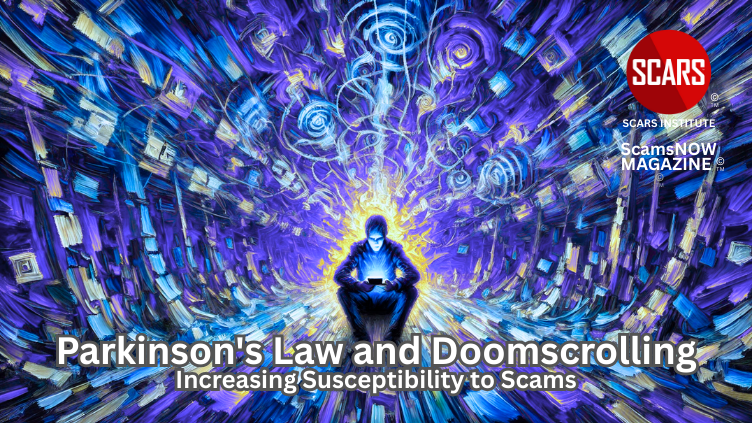Parkinson’s Law and Doomscrolling – Increasing Susceptibility to Scams
Parkinson’s Law and the Doomscrolling Trap: How Excess Screen Time Erodes Judgment and Increases Vulnerability to Scams and Misinformation
Primary Category: Psychology of Scams
Intended Audience: General Public
Author:
• Tim McGuinness, Ph.D., DFin, MCPO, MAnth – Anthropologist, Scientist, Polymath, Director of the Society of Citizens Against Relationship Scams Inc.
About This Article
Doomscrolling on platforms like Facebook, X, Instagram, and LinkedIn may feel like harmless downtime, but Parkinson’s Law shows why it rarely stops at just a few minutes. When you allow unlimited screen time, your attention naturally expands to fill that space, leaving you mentally overstimulated and emotionally drained. This has real consequences.
Repeated exposure to emotionally charged content activates the amygdala, reduces your brain’s logical function, and makes you more vulnerable to scams, fake news, and misinformation. It affects everyone—professionals, students, retirees, parents, and political news followers alike. The more you scroll without structure, the more your ability to think critically and recognize manipulation is eroded. What begins as innocent curiosity becomes cognitive exhaustion, and in that exhausted state, bad actors thrive.

Parkinson’s Law and the Doomscrolling Trap: How Excess Screen Time Erodes Judgment and Increases Vulnerability to Scams and Misinformation
Have you ever heard of Parkinson’s Law? You’ve probably told yourself, “I’ll just check Facebook for five minutes,” or “Let me catch up on Instagram before bed.” But two hours later, you’re still scrolling—through newsfeeds, suggested reels, or comment threads that go nowhere. If this feels familiar, it’s not a failure of willpower.
It’s Parkinson’s Law at work.
Work expands to fill the time available for its completion. That was the original premise, but the law applies just as well to attention. If you give yourself an hour to “relax online,” your scrolling, swiping, and clicking will quietly expand to occupy that entire hour. And if you’re not careful, it will take more than time—it will consume mental clarity, emotional regulation, and the critical thinking needed to protect yourself in a digital world full of manipulative content and bad actors.
Parkinson’s Law plays out in your daily screen habits and how doomscrolling—especially across platforms like Facebook, X, Instagram, and LinkedIn—puts different groups of people at risk. Whether you’re a student, professional, retiree, or business owner, the longer you scroll, the more vulnerable you become to scams, fake news, and psychological manipulation. And it’s not just about wasted hours—it’s about what that time does to your brain.
The Expanding Nature of Screen Time
No one schedules doomscrolling. It happens passively. You open an app for a specific reason—to check a message or see a notification—but once inside, your attention gets hijacked. Algorithms present a never-ending stream of emotional stimuli, each designed to keep you engaged. Before long, your “just five minutes” has turned into an hour or more.
This is Parkinson’s Law in action. The task (scrolling) grows to fill whatever time is available. If you have two hours until your next meeting or appointment, your brain senses no urgency, so it allows your attention to drift. And once that window is filled with passive consumption, the harder it becomes to stop.
This is not harmless leisure. What begins as casual scrolling often becomes emotionally charged. You might encounter political outrage, economic fear, sensational crimes, or personal posts meant to trigger sympathy, envy, or validation-seeking. These aren’t neutral stories. They’re engineered to activate your amygdala—the brain’s center for emotional responses like fear and anger.
Once the amygdala is triggered repeatedly, your ability to think critically declines. Executive functions, like rational analysis, pattern recognition, and long-term planning, shift to the backseat. This is how misinformation spreads. And it’s why you, or anyone else, becomes more susceptible to scams or manipulative content after spending too much time online.
What Doomscrolling Does to Your Brain
Every time you scroll through emotionally charged content, especially when it’s unpredictable or alarming, your brain releases stress hormones like cortisol and adrenaline. Over time, this creates a neurological feedback loop: your brain starts to expect stimulation, making it harder to disengage and rest.
At the same time, the constant influx of fragmented information taxes your prefrontal cortex, the part of the brain responsible for logical reasoning and impulse control. The result is emotional overload, poor judgment, and reduced awareness. The more time you allow for digital wandering, the more you wear down the very tools you need to recognize manipulation.
Scammers, propagandists, and malicious actors count on this. They know your guard is down when your brain is tired. They know that fake headlines, romantic scams, and fraudulent offers will land better when you’re emotionally saturated, overstimulated, and browsing without intention.
Different Groups, Same Risk
Parkinson’s Law affects everyone differently, depending on their routine, goals, and digital habits. But the outcome is consistent: extended online time without purpose weakens your psychological defenses.
Professionals
You may think checking LinkedIn or newsfeeds during a break is harmless. But what begins as a productivity break often expands into unproductive browsing. A single article turns into an hour of clickbait, much of it framed to generate outrage or anxiety. By the time you return to work, your cognitive clarity is compromised—and if a scam email or fake business proposal crosses your path, you’re less likely to scrutinize it.
Students
For students, the illusion is that there’s always time. Parkinson’s Law ensures that if there are five hours before an assignment is due, four of them can be lost to TikTok or Instagram. During those hours, students absorb a mix of pop culture, peer pressure, and disinformation. Scams targeted at younger users—like fake giveaways or phony internship offers—are far more likely to succeed when time has been spent mindlessly, leaving little cognitive energy for discernment.
Parents and Caregivers
For caregivers, especially those juggling multiple responsibilities, screen time often becomes a form of escape. It’s understandable—but also dangerous. Time spent doomscrolling under the guise of “relaxation” often turns into an extended emotional rollercoaster. When parenting decisions or financial choices must be made later, those judgments can be clouded by residual emotional activation. And when scammers use urgency-based tactics—“act now or lose access”—exhausted minds are more likely to comply.
Seniors and Retirees
Many older adults use platforms like Facebook to stay connected, which can be beneficial. But Parkinson’s Law still applies. A 20-minute check-in can become two hours of scrolling through conspiracy theories, political rage bait, or emotionally manipulative stories. Scammers targeting seniors with fake investment opportunities or impersonation schemes rely on this extended exposure. The more time spent immersed in emotional content, the easier it is to fall for a believable lie.
Entrepreneurs and Small Business Owners
Even business owners, who often see social media as a tool, are at risk. What starts as checking metrics or posting an update can turn into hours of watching trends, comparing competitors, or spiraling through economic fear posts. When mental fatigue sets in, business owners may click on fraudulent “platform update” emails or fall for phishing schemes disguised as client inquiries.
Political Doomscrollers
Some individuals spend hours each day doomscrolling political content—news, commentary, debates, and outrage-driven posts. While staying informed is important, overexposure to divisive or emotionally charged topics can distort your worldview and exhaust your mental filters. Parkinson’s Law ensures that if you give your afternoon to “catching up on the news,” it will soon expand into endless reading, commenting, and reacting. Political scammers—those spreading fake petitions, donation frauds, or disinformation campaigns—thrive on this exhaustion. The more emotionally invested you are, the easier it becomes to manipulate your judgment under the guise of civic duty or ideological alignment. Anger and fear may feel purposeful, but without boundaries, they only leave you more vulnerable.
Why Awareness Alone Isn’t Enough
You may recognize that doomscrolling is a problem. You may even tell yourself to stop. But Parkinson’s Law doesn’t respond to good intentions. It responds to structure.
If you have time available, and you haven’t consciously limited your digital activity, that time will be filled—often with whatever your algorithm feeds you. Without structure, your brain will default to what’s easiest and most emotionally stimulating. That’s how the cycle repeats daily, quietly eroding your ability to stay informed, alert, and scam-resistant.
Even apps that promise to make life easier—news aggregators, AI feeds, recommendation tools—often make the problem worse. They supply a constant stream of curated content with no stopping point. You aren’t just filling time. You’re allowing your cognitive filters to be slowly worn down by design.
Practical Steps to Regain Control
The first step is acknowledging how Parkinson’s Law applies to your online behavior. Then, begin replacing passive scrolling with purpose-driven activity.
- Set hard time limits before you open an app—not after. Use screen time tools or timers to reinforce this boundary.
- Identify your go-to platforms and assign a reason to each (e.g., “I use LinkedIn to read job posts,” not to browse). If the purpose isn’t met within 10 minutes, close it.
- Replace idle time with analog habits that calm the mind: walks, phone calls, reading physical books. These help reset your emotional baseline and restore critical thinking.
- Monitor emotional shifts. If you feel more anxious, angry, or confused after being online, take a break. That emotional shift is a red flag—not something to ignore.
- Develop a “scam shield” checklist. Remind yourself what red flags to look for: urgency, secrecy, too-good-to-be-true offers, and any request for personal information.
Conclusion: Your Time Is Mental Currency
Every hour you spend online is a transaction. You’re trading your attention, emotional energy, and cognitive capacity for content. The longer you stay, the more costly it becomes.
Parkinson’s Law explains why this transaction is so easy to lose track of. If you have a window of time, your behavior will stretch to fill it—especially when driven by apps designed to feed you addictive, emotionally charged content. When that behavior becomes a habit, it changes how you process information, how you assess risk, and how vulnerable you are to manipulation.
Scams, fake news, and misinformation aren’t just problems of low intelligence or gullibility. They are often symptoms of mental fatigue, emotional overactivation, and poor time boundaries. These are the direct consequences of unchecked online habits.
You don’t need to eliminate social media. But you do need to manage it with the same discipline you apply to finances or health. Time online should be treated as an investment—not a bottomless space to wander. When you take control of your time, you protect your brain, your boundaries, and your ability to navigate a world increasingly shaped by digital manipulation.
And the more people who understand this, the harder it becomes for bad actors to succeed.
-/ 30 /-
What do you think about this?
Please share your thoughts in a comment below!
Statement About Victim Blaming
SCARS Institute articles examine different aspects of the scam victim experience, as well as those who may have been secondary victims. This work focuses on understanding victimization through the science of victimology, including common psychological and behavioral responses. The purpose is to help victims and survivors understand why these crimes occurred, reduce shame and self-blame, strengthen recovery programs and victim opportunities, and lower the risk of future victimization.
At times, these discussions may sound uncomfortable, overwhelming, or may be mistaken for blame. They are not. Scam victims are never blamed. Our goal is to explain the mechanisms of deception and the human responses that scammers exploit, and the processes that occur after the scam ends, so victims can better understand what happened to them and why it felt convincing at the time, and what the path looks like going forward.
Articles that address the psychology, neurology, physiology, and other characteristics of scams and the victim experience recognize that all people share cognitive and emotional traits that can be manipulated under the right conditions. These characteristics are not flaws. They are normal human functions that criminals deliberately exploit. Victims typically have little awareness of these mechanisms while a scam is unfolding and a very limited ability to control them. Awareness often comes only after the harm has occurred.
By explaining these processes, these articles help victims make sense of their experiences, understand common post-scam reactions, and identify ways to protect themselves moving forward. This knowledge supports recovery by replacing confusion and self-blame with clarity, context, and self-compassion.
Additional educational material on these topics is available at ScamPsychology.org – ScamsNOW.com and other SCARS Institute websites.
-/ 30 /-
What do you think about this?
Please share your thoughts in a comment below!
3 Comments
Leave A Comment
Important Information for New Scam Victims
- Please visit www.ScamVictimsSupport.org – a SCARS Website for New Scam Victims & Sextortion Victims.
- SCARS Institute now offers its free, safe, and private Scam Survivor’s Support Community at www.SCARScommunity.org – this is not on a social media platform, it is our own safe & secure platform created by the SCARS Institute especially for scam victims & survivors.
- SCARS Institute now offers a free recovery learning program at www.SCARSeducation.org.
- Please visit www.ScamPsychology.org – to more fully understand the psychological concepts involved in scams and scam victim recovery.
If you are looking for local trauma counselors, please visit counseling.AgainstScams.org
If you need to speak with someone now, you can dial 988 or find phone numbers for crisis hotlines all around the world here: www.opencounseling.com/suicide-hotlines
Statement About Victim Blaming
Some of our articles discuss various aspects of victims. This is both about better understanding victims (the science of victimology) and their behaviors and psychology. This helps us to educate victims/survivors about why these crimes happened and not to blame themselves, better develop recovery programs, and help victims avoid scams in the future. At times, this may sound like blaming the victim, but it does not blame scam victims; we are simply explaining the hows and whys of the experience victims have.
These articles, about the Psychology of Scams or Victim Psychology – meaning that all humans have psychological or cognitive characteristics in common that can either be exploited or work against us – help us all to understand the unique challenges victims face before, during, and after scams, fraud, or cybercrimes. These sometimes talk about some of the vulnerabilities the scammers exploit. Victims rarely have control of them or are even aware of them, until something like a scam happens, and then they can learn how their mind works and how to overcome these mechanisms.
Articles like these help victims and others understand these processes and how to help prevent them from being exploited again or to help them recover more easily by understanding their post-scam behaviors. Learn more about the Psychology of Scams at www.ScamPsychology.org
SCARS INSTITUTE RESOURCES:
If You Have Been Victimized By A Scam Or Cybercrime
♦ If you are a victim of scams, go to www.ScamVictimsSupport.org for real knowledge and help
♦ SCARS Institute now offers its free, safe, and private Scam Survivor’s Support Community at www.SCARScommunity.org/register – this is not on a social media platform, it is our own safe & secure platform created by the SCARS Institute especially for scam victims & survivors.
♦ Enroll in SCARS Scam Survivor’s School now at www.SCARSeducation.org
♦ To report criminals, visit https://reporting.AgainstScams.org – we will NEVER give your data to money recovery companies like some do!
♦ Follow us and find our podcasts, webinars, and helpful videos on YouTube: https://www.youtube.com/@RomancescamsNowcom
♦ Learn about the Psychology of Scams at www.ScamPsychology.org
♦ Dig deeper into the reality of scams, fraud, and cybercrime at www.ScamsNOW.com and www.RomanceScamsNOW.com
♦ Scam Survivor’s Stories: www.ScamSurvivorStories.org
♦ For Scam Victim Advocates visit www.ScamVictimsAdvocates.org
♦ See more scammer photos on www.ScammerPhotos.com
You can also find the SCARS Institute’s knowledge and information on Facebook, Instagram, X, LinkedIn, and TruthSocial
Psychology Disclaimer:
All articles about psychology and the human brain on this website are for information & education only
The information provided in this and other SCARS articles are intended for educational and self-help purposes only and should not be construed as a substitute for professional therapy or counseling.
Note about Mindfulness: Mindfulness practices have the potential to create psychological distress for some individuals. Please consult a mental health professional or experienced meditation instructor for guidance should you encounter difficulties.
While any self-help techniques outlined herein may be beneficial for scam victims seeking to recover from their experience and move towards recovery, it is important to consult with a qualified mental health professional before initiating any course of action. Each individual’s experience and needs are unique, and what works for one person may not be suitable for another.
Additionally, any approach may not be appropriate for individuals with certain pre-existing mental health conditions or trauma histories. It is advisable to seek guidance from a licensed therapist or counselor who can provide personalized support, guidance, and treatment tailored to your specific needs.
If you are experiencing significant distress or emotional difficulties related to a scam or other traumatic event, please consult your doctor or mental health provider for appropriate care and support.
Also read our SCARS Institute Statement about Professional Care for Scam Victims – click here
If you are in crisis, feeling desperate, or in despair, please call 988 or your local crisis hotline – international numbers here.
More ScamsNOW.com Articles
A Question of Trust
At the SCARS Institute, we invite you to do your own research on the topics we speak about and publish. Our team investigates the subject being discussed, especially when it comes to understanding the scam victims-survivors’ experience. You can do Google searches, but in many cases, you will have to wade through scientific papers and studies. However, remember that biases and perspectives matter and influence the outcome. Regardless, we encourage you to explore these topics as thoroughly as you can for your own awareness.















![NavyLogo@4x-81[1] Parkinson's Law and Doomscrolling - Increasing Susceptibility to Scams - 2025](https://scamsnow.com/wp-content/uploads/2025/04/NavyLogo@4x-811.png)










![scars-institute[1] Parkinson's Law and Doomscrolling - Increasing Susceptibility to Scams - 2025](https://scamsnow.com/wp-content/uploads/2025/04/scars-institute1.png)

![niprc1.png1_-150×1501-1[1] Parkinson's Law and Doomscrolling - Increasing Susceptibility to Scams - 2025](https://scamsnow.com/wp-content/uploads/2025/04/niprc1.png1_-150x1501-11.webp)
It’s so very true how our mind can wander on an app if we don’t set time limits for using it. Also, I myself felt the ups and downs of my emotional baseline during the pandemic. Usually, I felt sad, longing for something I did not have but thought I needed, or even envious.
We surf the Internet often aimlessly, for hours without realizing how doomscrolling has a harmful effect on our body, our brain , emotions …. How to change our behavior, how to consciously control our online activity.?
This article is a must-read for every internet user
A very interesting read. I enjoyed it and love learning something new. Thanks for adding the tools to help break the cycle!